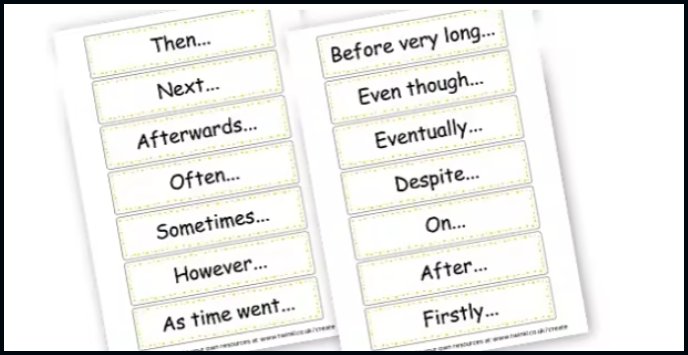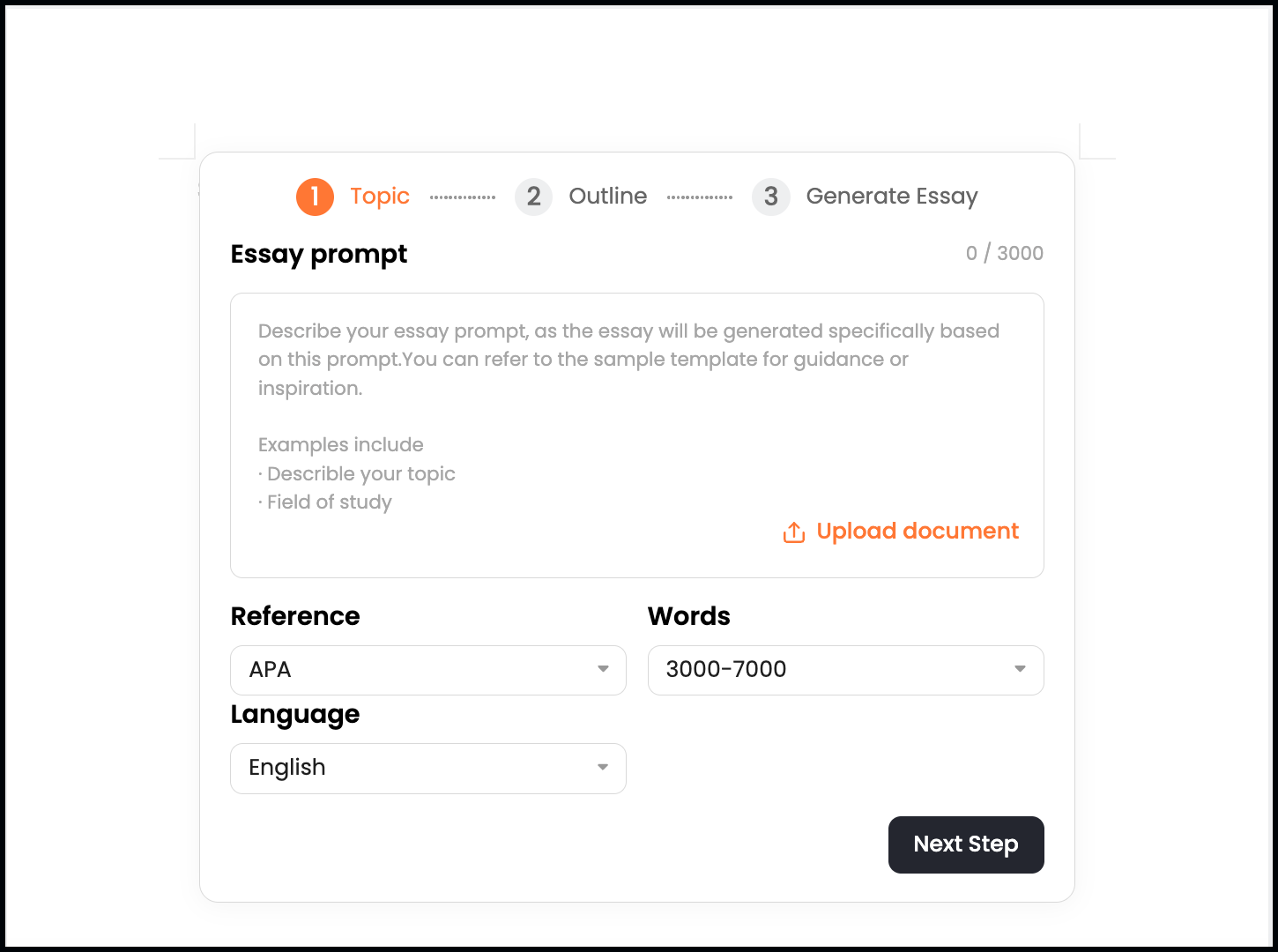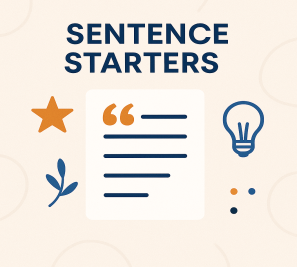Sometimes, when students write assignments, essays, or even answers on their exams, they know what they want to say but are unable to figure out where to begin.
No wonder this is the most common issue faced by students, especially those whose native language is not English, as they often lack sufficient knowledge of words and their synonyms.
This is where sentence starters for essays come into play! They are kinds of phrases or transition words that begin various types of sentences and reveal what information to expect later.
Are you facing a similar issue in your academic writing or essays? Keep scrolling!
What Is a Sentence Starter?

Sentence starters are phrases or words that introduce a thought or begin a sentence. They make your writing more meaningful and connected to a great extent.
In academic writing texts (exceptionally long ones), these sentence starters are crucial to unify the whole work. This is because every sentence has its own separate topic.
Hence, your ideas mainly differ by jumping from point to point, which leads to abruptness and a lack of consistency. However, sentence starters make the process easier for readers.
It prepares readers for what is going to happen next, introducing a new idea, evidence, or argument in essays to facilitate better understanding.
For example, if you write “On the contrary” at the beginning of a sentence, the reader will instantly guess that you’re going to talk about an opposite view of something.
Similarly, if you’re to conclude something, you can write “In conclusion,” “As a result,” or any other starting phrase to support your concluding sentences next.
This also fills a gap between the current and previous topics or ideas mentioned. Normally, we use sentence starters to achieve a smooth flow, and this technique is vital for making connections.
Why Do Sentence Starters Matter?
Now that you know what sentence starters are, a question may pop up in your mind: Why should you use them in essay writing? Why are they so important?
Well, when you feel the ultimate need to move, relate, or transition to another point, sentence references come in handy to maintain a proper flow.
They are dependent on where it actually matters. Moreover, it depends on what the writer is writing. This is because you ought to put them in areas where you feel the need.
Not only this, but the context also matters to fit them correctly. Transition words keep essay writing pretty natural, so you can decide when and where to use them.
Here are the most common reasons that show their importance and why we use them:
- To introduce a topic or idea to hook attention (Words like “Let’s get started”)
- To compare and contrast various ideas (Words like “On the other hand”)
- To write a list or table in complex topics (Words like “Below is the list of”)
- To mention clear examples (Words like “For instance”)
- To summarize history or a topic (Words like “Initially”)
- To begin a new thought (Words like “Furthermore”)
- To show outcome or reasons (Words like “As a result”)
- To mention references in your essay (Words like “According to”)
- To give your opinions (Words like “Without a doubt”)
Apart from essay writing, you also need sentence starters in other types of writing. They are equally beneficial in other forms of writing, like emails, creative writing, or business reports.
The audience of your writing and the overall purpose will ultimately determine the best type of sentence starters to use. Yes, that’s right!
Once you start using them, you’ll notice how they make things a lot easier than before. Due to their significant importance, they are widely used in academia.
How to Use Good Sentence Starters for Essays?

The purpose of sentence starters isn’t to use fancy words to sound creative. Instead, they are used to guide your readers through your ideas in a smooth and seamless manner.
However, some students face challenges in using them effectively and end up over-using them or else using the wrong starters in the wrong place.
Remember that you need to understand the purpose of your paragraph first to use it correctly and in context.
Common sentence starters by function include:
- Introducing a New Idea
“One key point is” , “To begin with”
- Compare Two Things
“Similarly” , “In contrast”
Do not simply copy and paste any starters you find online. Instead, you need to tweak them to fit your unique voice and criteria.
For instance, instead of saying, “For example,” you can simply say, “One real-life example is…” or “Take this case.” It keeps writing in a super fresh and avoids a robotic tone.
And let’s not forget to talk about the balance! Balance is essential in sentence starters. Don’t just begin every sentence with starters; it will feel forceful.
It’s better to use them only at the beginning of paragraphs or where you feel the need to connect big ideas. Your natural flow will fill in the rest of the parts.
Tips for mastering sentence starters:
- Create a cheat sheet grouping starters by their purpose (introducing, comparing, concluding, etc.) to reference when writing.
- Read your essay aloud to catch any awkward or overused starters, then revise accordingly.
With practice, using sentence starters will become second nature and greatly improve the clarity and flow of your essays.
Sentence Starters for Different Parts of an Essay
Different parts of an essay require different sentence starters. If you’re eager to know how to use good sentence starters for essays, have a look below:
1) Introduction Starters
The introduction undoubtedly sets the stage for your essay. Therefore, it’s crucial to start with a strong opening that captures the attention of readers.
Some effective examples of sentence starters for introduction in essays are:
- “This essay aims to explore…”
- “The debate surrounding…”
- “One of the most pressing issues…”
- “In today’s society…”
- “Recent research has shown…”
Starting the essay with a good statement that addresses your topic directly makes the foundation for your argument to pique the interest of readers.
2) Body Paragraph Starters
When you move into the essay’s body section, it becomes very much critical. Sentence starters assist in structuring your arguments, maintaining a logical flow, and providing clarity.
Look at these examples for paragraph starters:
- “A crucial example of this is…”
- “One key argument is…”
- “Furthermore, evidence suggests…”
- “This idea is supported by…”
- “It can be argued that…”
This way, you can ensure that your paragraphs are nicely built on each other and provide a persuasive and coherent argument.
3) Conclusion Starters
Lastly, the conclusion part is where you get the chance to conclude or summarize your arguments or key points. For this section, sentence openers must be very definitive and strong.
You can consider the following options for conclusion sentence starters:
- “Thus, it can be seen that…”
- “Ultimately, this analysis shows that…”
- “To summarise, the evidence points to…”
- “As a result, it is evident that…”
- “In conclusion, it is clear that…”
All these starters will help you wrap up the essay easily while leaving a positive impact.
If you realize that you are using similar sentence starters very frequently, try Oreate AI essay writing tool to generate the best synonyms and improve essay sentence starters.
Types of Sentence Starters for Essays

Based on the role of your essay and its type, sentence starters can also vary to best suit a specific type of essay without sounding awkward.
Read on to discover more details about those types:
1) Sentence Starters for Argumentative Essay
This kind of essay usually defends separate reasons for the main argument. Often, these essays have the following sentence starters:
- For example
- The evidence reveals that
- Another reason
- Additionally
- One of the main reasons
- Furthermore
- However
- Despite this argument
- Nonetheless
- According to author
- In addition
2) Sentence Starters for Evidence in Essays
No matter whether you’re working on a research-based, analytical, or argumentative essay, you’ll have to present evidence confidently and clearly. Starters to present evidence include:
- This is evident when
- This demonstrates
- Statistics indicate that
- Research shows that
- For instance
- A study conducted by [source] revealed
- As illustrated by
- This supports the idea that
- According to the data
3) Sentence Starters for a Persuasive Essay
In persuasive essays, the writer’s goal is to convince readers to agree with their viewpoint. This means your sentence starters must be clear and assertive, such as:
- One cannot ignore
- Without a doubt
- Clearly
- Let’s not forget
- It is widely believed that
- The truth is
- It is essential to realize that
- The fact remains
- What’s more
- Consider this
4) Sentence Starters for an Informative Essay
Informative essays explain or teach the readers about a specific topic. In this type, the best sentence starters are clear, topic-focused, and clear. Try using the below starters in this type:
- Another key point is
- In other words
- For example
- To begin with
- One important fact is
- To better understand
- This means that
- In summary
- A common misconception is
- It is crucial to note that
5) Sentence Starters for Narrative Writing
For this type of essay, where the writer describes an event and its meaning or significance, the sentence starters given below best serve the purpose:
- After that
- On the next day
- Since that day
- When we arrived at
- It all started when
- Looking back now
- The day began with
- Later that morning
- The situation became more complex when
Can’t Find the Best Sentence Starters? Try Oreate AI Essay Writer
Got a long list of sentence starters but aren’t sure which ones to use? Start with Oreate AI, an AI-powered writing tool that can generate a complete essay for you—featuring effective sentence starters tailored to each part of your paper.
Oreate AI isn’t just for drafting long essays; it’s also widely used to help writers find the right sentence starters exactly when they need them. More offering include:
- Essay Writing: Generates complete, well-structured essays based on your prompts.
- Paraphrasing: Rewrites sentences to avoid repetition and enhance originality.
- Humanizing: Adjusts tone and style to make your writing sound natural and engaging.
- Citation: Automatically creates accurate citations in multiple formats to support your sources.
- Formatting: Applies proper academic formatting styles (APA) to your essays for professional presentation.
The best part? You only need to provide a simple text prompt outlining your requirements and specify your language. Oreate’s advanced engine then crafts a well-structured essay with the most relevant and natural sentence starters throughout.
Unlike ChatGPT or other writing tools that can sound robotic, Oreate AI delivers polished, context-aware content you can rely on every time. Read the full guide to get started your essay writing with good sentence starters.

FAQs
Q1. What are sentence starters used for?
Sentence starters undoubtedly make your writing more meaningful and connected. They prepare your audience for what is coming and let you bridge a nice gap between any thought, its contradiction, its justification, affirming evidence, examples, and so on.
Q2. What are some sentence starters for an essay?
Below are examples of some essay starters you can use at the start of an essay:
- In this essay
- The essay discusses
- The essay will introduce you to
- This essay focuses on
Q3. Do sentence starters for essays improve essay grades?
Definitely! Using sentence starters improves your essay and makes it organized and more readable. This leads to positive feedback and better grades from your examiner.
Q4. How do you start an essay?
First, you need to introduce a topic and provide important background information that your readers will need to understand the main problem or argument you’re going to present there. Additionally, it’s beneficial to define any key terms beforehand that may be unfamiliar to readers.
Q5. How can I avoid repetitive sentence starters?
If you want to avoid repetition, try to vary the structure of your sentences and use different transitional phrases or sentences to keep your writing engaging and fresh.



